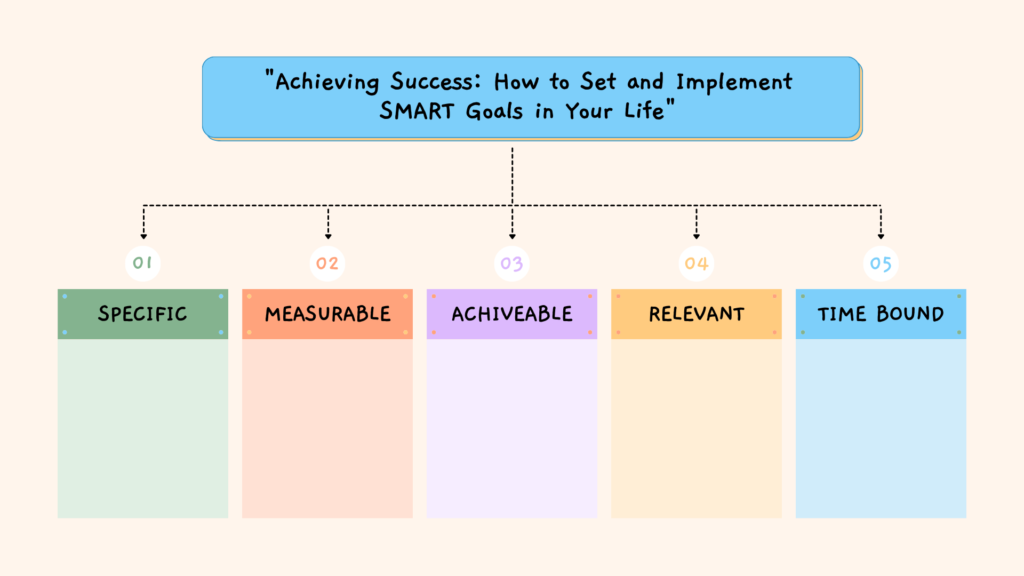
Success is often defined by the goals we set for ourselves and our ability to achieve them. One effective method for setting and achieving goals is by using the SMART criteria. SMART goals are Specific, Measurable, Achievable, Relevant, and Time-bound. By following this method, you can create clear and attainable goals that will help you stay focused and motivated on your path to success. In this article, we will discuss how to set and implement SMART goals in your life.
What is a Goal?
A goal is a desired result or outcome that a person or an organization aims to achieve through continuous effort and planning. It serves as a target or a guiding point for individuals or teams to focus their actions and resources. Goals can be short-term or long-term and can encompass various aspects of life, such as personal growth, career advancement, health, relationships, or financial stability. Setting and working towards goals helps individuals stay motivated, organized, and accountable, ultimately leading to personal and professional growth and success.

What is a SMART goal?
A SMART goal is a well-defined and structured objective that follows the SMART criteria, making it more effective and achievable. The acronym SMART stands for:
Specific: The goal is clear, precise, and unambiguous, providing a detailed description of what needs to be accomplished. It typically answers the questions of who, what, where, when, and why.
Measurable: The goal includes quantifiable elements or metrics that allow you to track progress and determine when the goal has been achieved. This helps in evaluating success and making necessary adjustments along the way.
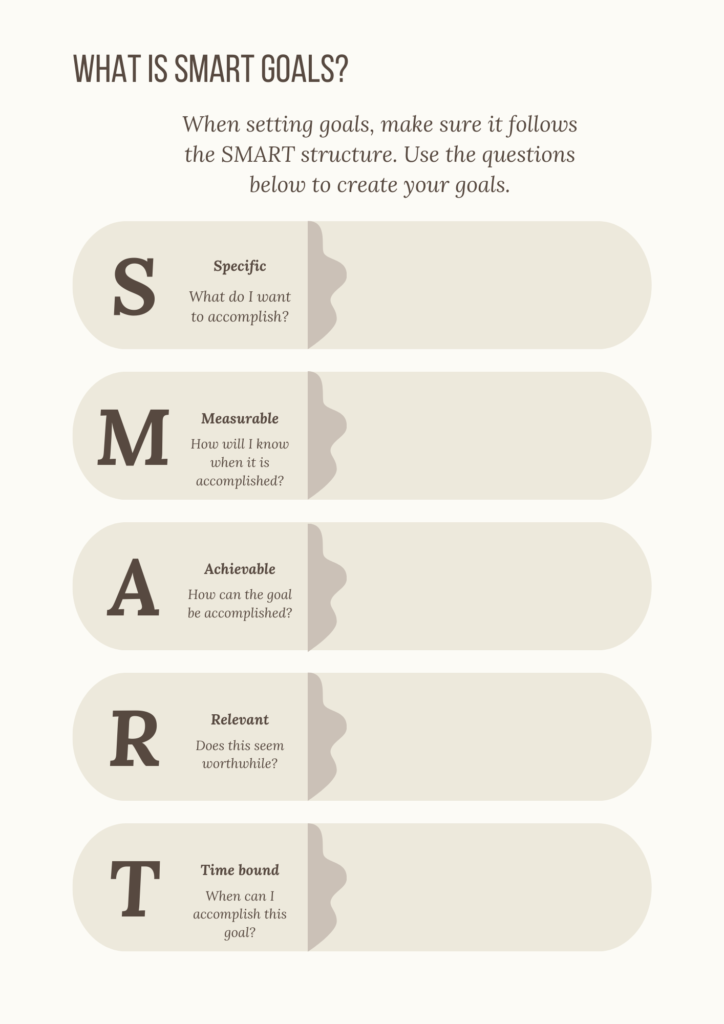
Achievable: The goal is realistic and attainable, considering the individual’s or organization’s resources, skills, and time constraints. It should be challenging yet within reach, striking a balance between being too easy or overly ambitious.
Relevant: The goal aligns with the individual’s or organization’s values, priorities, and long-term objectives. This ensures that efforts are focused on what truly matters and contributes to overall success.
Time-bound: The goal has a specific deadline or timeframe, creating a sense of urgency and helping maintain focus on achieving it. Time constraints also enable breaking down the goal into smaller, more manageable tasks with their own deadlines.
SMART goals are designed to provide clarity, direction, and motivation, making it easier for individuals and organizations to plan, execute, and achieve their desired outcomes.
Why SMART Goals are Important for Personal and professional development
SMART goals are important for both personal and professional life because they provide a structured and effective approach to goal-setting, leading to better chances of success. Here are some reasons why SMART goals are crucial for personal and professional growth:
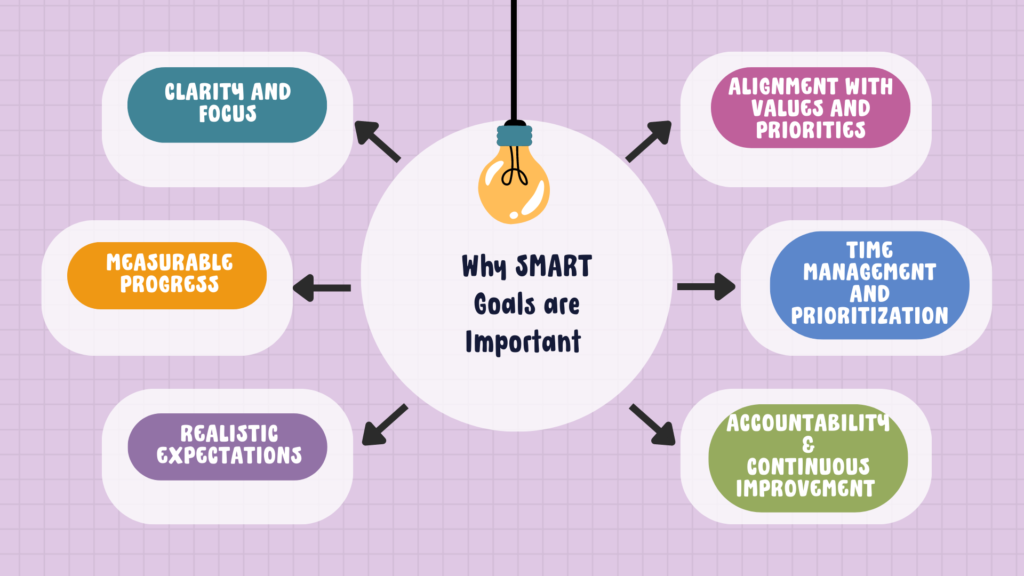
Clarity and focus
By setting specific and well-defined goals, individuals can clearly understand what they want to achieve, helping them stay focused on their objectives and avoid distractions.
Measurable progress
SMART goals include quantifiable elements that enable tracking progress and evaluating success. This helps individuals stay motivated, adjust their strategies when needed, and celebrate accomplishments along the way.
Realistic expectations
By ensuring that goals are achievable and considering available resources, skills, and time constraints, individuals set themselves up for success. This helps prevent frustration and disappointment caused by setting overly ambitious or unattainable goals.
Alignment with values and priorities
Setting relevant goals ensures that individuals invest their time and energy in what truly matters to them, contributing to their overall happiness and satisfaction in both personal and professional life.
Time management and prioritization
Time-bound goals encourage better time management and prioritization of tasks. Individuals can allocate their time and resources effectively by breaking down goals into smaller tasks with deadlines, increasing productivity and efficiency.
Accountability
SMART goals help individuals take responsibility for their actions and progress, fostering a sense of ownership and commitment. This can lead to improved self-discipline, resilience, and personal growth.
Continuous improvement
The process of setting and working towards SMART goals encourages reflection, learning, and adaptation. This continuous improvement mindset can lead to personal and professional growth as individuals refine their strategies and develop new skills to achieve their objectives.
How to Set SMART Goals: Steps
Setting SMART goals is a great way to create achievable and realistic objectives. SMART stands for Specific, Measurable, Achievable, Relevant, and Time-bound. Follow these steps to set your own SMART goals:
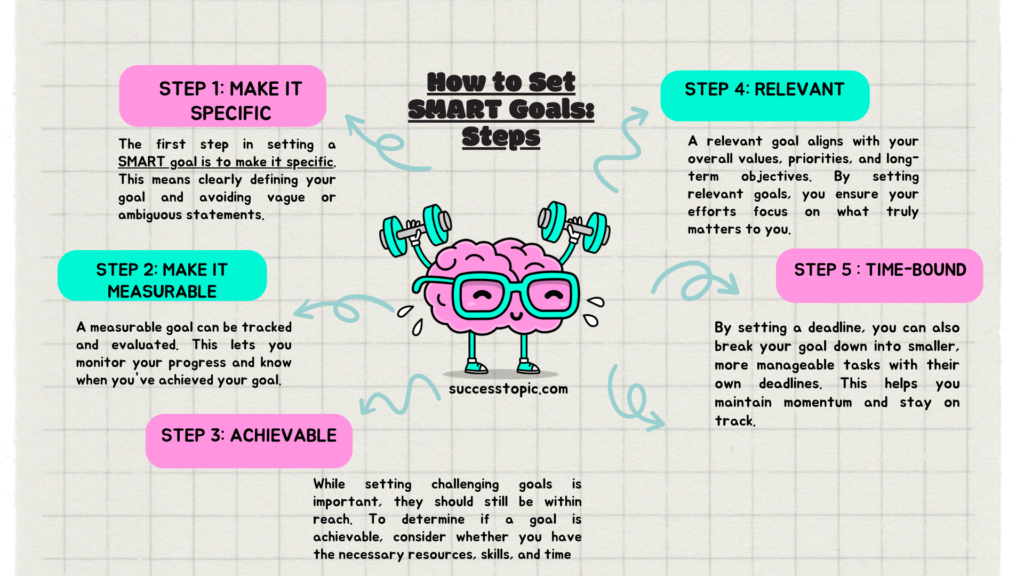
1. Specific
The first step in setting a SMART goal is to make it specific. This means clearly defining your goal and avoiding vague or ambiguous statements. A specific goal should answer the questions of who, what, where, when, and why. For example, instead of saying, “I want to lose weight,” a specific goal would be, “I want to lose 10 pounds in the next three months by exercising regularly and eating healthier.”
How can you make your goal specific?
Make your goal clear and specific. Consider what you want to achieve, why it’s important, and how you will accomplish it. Ask yourself the following questions:
- What do I want to accomplish?
- Why is this goal important to me?
- How will I achieve this goal?
2. Measurable
A measurable goal can be tracked and evaluated. This lets you monitor your progress and know when you’ve achieved your goal. To make your goal measurable, determine the metrics you will use to track your progress. In the weight loss example, you could track your weight, body measurements, or the number of days you exercise each week.
How can you make your goal Measurable?
Your goal should be measurable so that you can track your progress and know when you’ve achieved it. Determine how you will measure your progress and what success looks like. Ask yourself:
- How will I know when I’ve reached my goal?
- What indicators will show my progress?
3. Achievable
An achievable goal is one that is realistic and attainable, given your current resources, skills, and time constraints. While setting challenging goals is important, they should still be within reach. To determine if a goal is achievable, consider whether you have the necessary resources, skills, and time to accomplish it. If not, you may need to adjust your goal or develop a plan to acquire the necessary resources.
How can you make your goal Achievable?
Ensure that your goal is realistic and attainable, given your current resources and constraints. Consider any potential obstacles and how you will overcome them. Ask yourself:
- Is this goal realistic, given my current situation?
- What steps do I need to take to achieve this goal?
- Are there any obstacles I may face, and how can I overcome them?
4. Relevant
A relevant goal aligns with your overall values, priorities, and long-term objectives. By setting relevant goals, you ensure your efforts focus on what truly matters to you. To determine if a goal is relevant, ask yourself if it aligns with your values and if it will contribute to your long-term success.
How can you make your goal Relevant?
Your goal should be relevant and aligned with your broader objectives and values. This will help ensure that achieving your goal is worthwhile and contributes to your overall success. Ask yourself:
- Is this goal in line with my long-term objectives?
- Does this goal align with my values and priorities?
5. Time-bound
A time-bound goal has a clear deadline, which creates a sense of urgency and helps you stay focused on achieving it. By setting a deadline, you can also break your goal down into smaller, more manageable tasks with their own deadlines. This helps you maintain momentum and stay on track. In the weight loss example, the three-month deadline provides a clear timeframe for achieving the goal.
How can you make your goal Time-bound?
Set a deadline for achieving your goal to create a sense of urgency and motivate you to stay focused. Make sure your deadline is realistic and achievable. Ask yourself:
- When do I want to achieve this goal?
- Given the steps I must take and potential obstacles, is this deadline realistic?
By following these steps and setting SMART goals, you’ll create clear, achievable objectives that will help you stay focused and motivated on your path to success.
How to Implementing SMART Goals in Your Life
Now that you know how to set SMART goals, it’s time to implement them. Here are some tips to help you get started:

Identify your goals
You can start by reflecting on your objectives in various areas of your life, such as personal, professional, health, and relationships. Consider both short-term and long-term goals.
Write down your goals.
Putting your goals in writing makes them more concrete and helps you stay committed to them. Keep your written goals visible so you’re constantly reminded of what you’re working towards.
Break down larger goals into smaller tasks.
Divide your goal into smaller, more manageable tasks to make it less overwhelming. This also allows you to track your progress and celebrate small victories along the way.
Make your goals SMART.
Transform your goals into SMART goals by ensuring they are Specific, Measurable, Achievable, Relevant, and Time-bound. This will help you create realistic and attainable objectives.
Prioritize your goals
Organize your goals in order of priority. This will help you focus on the most important objectives first and allocate your time and resources more effectively.
Create an action plan.
Develop a step-by-step plan outlining how you will achieve your goal. Include specific actions, resources, and deadlines for each task.
Monitor your progress
Regularly assess your progress towards your goal and adjust your plan as needed. This will help you stay on track and identify any obstacles that may be hindering your progress.
Review and adjust your goals.
Periodically review your SMART goals to ensure they remain relevant and aligned with your priorities. Adjust your goals as needed to reflect changes in your circumstances or priorities.
Stay accountable
Share your goals with someone who can offer support and hold you accountable. This can be a friend, family member, or mentor. Regular check-ins with this person can help you stay motivated and focused.
Celebrate your achievements
Acknowledge and celebrate your successes as you achieve your SMART goals. This will help boost your motivation and reinforce the value of setting and working towards SMART objectives.
You can achieve greater success and satisfaction by setting and implementing SMART goals in your life. Remember to be specific, measurable, achievable, relevant, and time-bound when defining your goals, and follow the tips above to stay on track and make your dreams a reality.
Tips to Make SMART Goals a Success
Achieving your SMART goals requires dedication, consistency, and the right approach. Here are some tips to help you make your SMART goals a success:
1. Break down your goals into smaller tasks
Divide your goals into smaller, more manageable tasks or milestones. This will make them less overwhelming and help you focus on one step at a time.
2. Create an action plan
Develop a detailed plan outlining the steps you need to take to achieve each goal. This will help you stay organized and ensure that you have a clear path to follow.
3. Stay committed and disciplined
Achieving your goals requires consistent effort and discipline. Stick to your action plan, and make a conscious effort to work towards your objectives every day.
4. Prioritize your goals
Focus on your most important goals first. This will help you allocate your time and resources more effectively and ensure that you’re making progress in the areas that matter most.
5. Set realistic deadlines
Assign a deadline for each goal and its smaller tasks. This will help create a sense of urgency and keep you motivated to work towards your objectives. Be realistic with your deadlines to avoid unnecessary stress and disappointment.
6. Track your progress
Regularly monitor your progress towards each goal by marking off completed tasks or milestones. This will help you stay motivated and provide a sense of accomplishment.
7. Stay accountable
Share your goals with a trusted friend, family member, or mentor who can help keep you accountable and provide support and encouragement. Alternatively, consider joining a goal-setting group or using an app to track your progress and stay accountable.
8. Be flexible and adaptable
Life is unpredictable, and sometimes your goals may need to be adjusted to accommodate changes in your circumstances or priorities. Be open to adapting your goals as needed and stay focused on your overarching objectives.
9. Learn from setbacks
Setbacks are a natural part of the goal-setting process. Instead of getting discouraged, use setbacks as an opportunity to learn and grow. Evaluate what went wrong and identify ways to improve your approach moving forward.
10. Celebrate your achievements
Acknowledge and celebrate your successes as you achieve your SMART goals. This will help boost your motivation and reinforce the value of setting and working towards SMART objectives.
By following these tips and staying committed to your SMART goals, you’ll be well on your way to achieving success in all areas of your life.
FAQS
Below are some frequently asked questions about SMART goals, answered using the information you provided:
1. What are SMART goals?
SMART goals are a method for setting well-defined, achievable, and trackable objectives. The acronym SMART stands for Specific, Measurable, Achievable, Relevant, and Time-bound. By following the SMART framework, individuals and teams can create goals that are clear, focused, and more likely to be accomplished within a given timeframe.
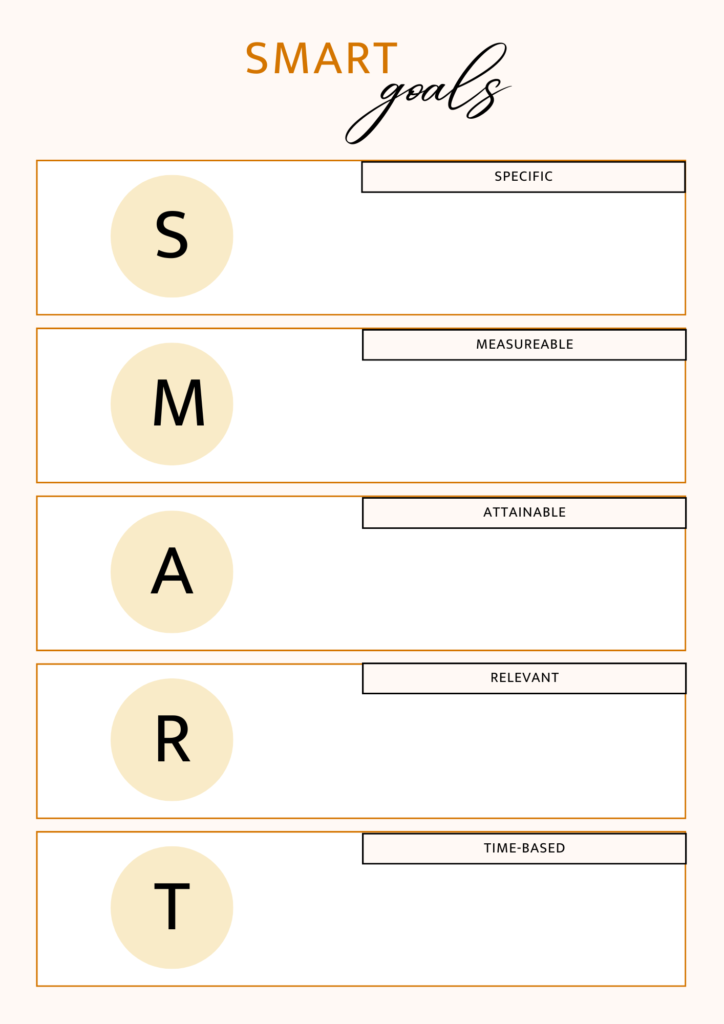
2. Why are SMART goals important?
SMART goals are important because they provide clarity, focus, and motivation for achieving objectives. They improve the ability to reach goals by encouraging individuals to define their objectives and set a completion date. SMART goals are also easy to use by anyone, without the need for specialist tools or training.
3. How do I write SMART goals?
To write SMART goals, break down each component of the acronym and ensure your goal meets each criterion:
Specific: Clearly define your goal and what you want to achieve.
Measurable: Establish how you will measure your progress and determine if the goal has been reached.
Achievable: Ensure the goal is realistic and attainable with available resources and time.
Relevant: Align the goal with your broader objectives and priorities.
Time-bound: Set a deadline for achieving the goal to create a sense of urgency.
4. How can I track my progress toward SMART goals?
Regularly monitor your progress by marking off completed tasks or milestones related to your goals. Tracking your progress helps you stay motivated and provides a sense of accomplishment. Sharing your goals with a trusted friend, family member, or mentor can also help keep you accountable and provide support and encouragement.
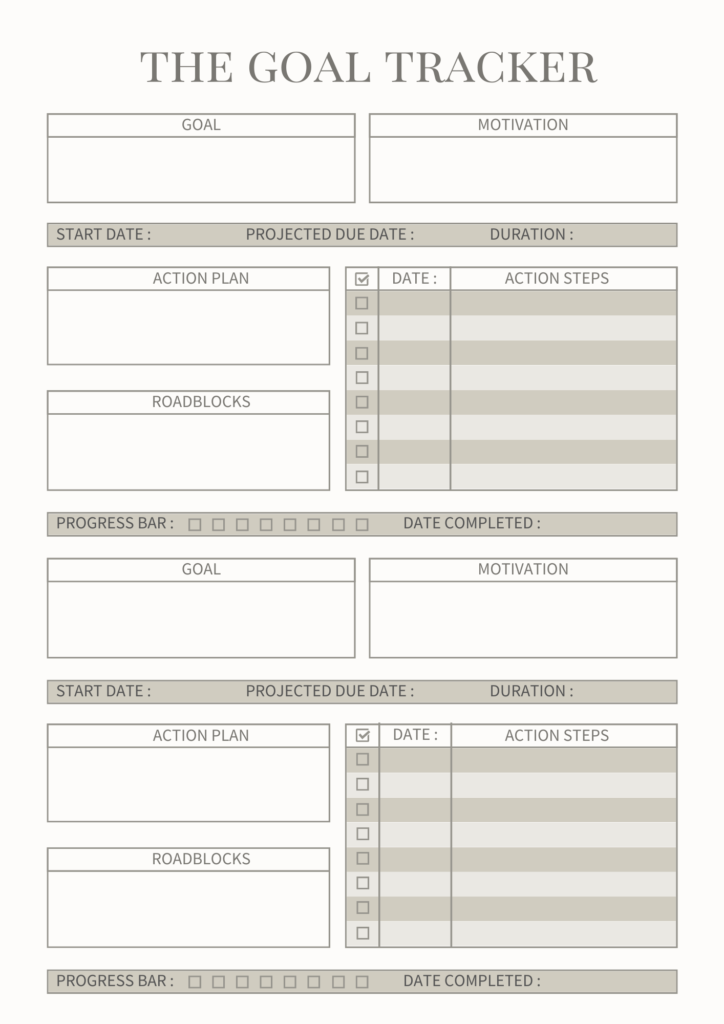
5. Can I adapt my SMART goals if my circumstances change?
Yes, being flexible and adaptable is essential when working toward SMART goals. Life is unpredictable, and sometimes goals may need to be adjusted to accommodate changes in circumstances or priorities. Be open to adapting your goals as needed and stay focused on your overarching objectives.
Few SMART goals Examples
SMART goals are specific, measurable, achievable, relevant, and time-bound objectives that help you plan and track your progress. Here are some examples of SMART goals:
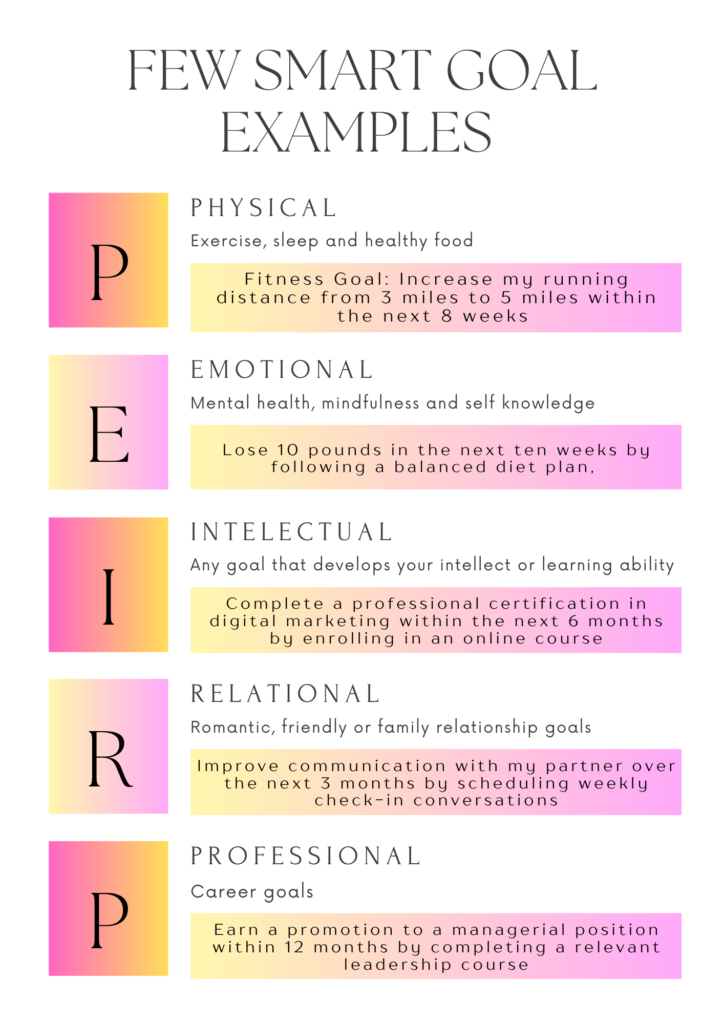
Fitness Goal: Increase my running distance from 3 miles to 5 miles within the next 8 weeks by adding 0.25 miles to my weekly runs and incorporating strength training twice a week.
Career Goal: Earn a promotion to a managerial position within 12 months by completing a relevant leadership course, volunteering for additional responsibilities, and receiving positive performance evaluations.
Personal Finance Goal: Save $5,000 for an emergency fund within the next 18 months by setting up an automatic monthly transfer of $278 from my checking account to a high-yield savings account.
Education Goal: Complete a professional certification in digital marketing within the next 6 months by enrolling in an online course, dedicating 5 hours per week to study, and passing the final exam.
Relationship Goal: Improve communication with my partner over the next 3 months by scheduling weekly check-in conversations, actively listening, and expressing appreciation for their thoughts and feelings.
Health Goal: Lose 10 pounds in the next ten weeks by following a balanced diet plan, tracking daily calorie intake, and exercising for at least 30 minutes five times a week.
Productivity Goal: Increase work efficiency and complete tasks 20% faster within the next 2 months by implementing time management techniques and reducing distractions during work hours.
SMART Goals Template
SMART stands for Specific, Measurable, Achievable, Relevant, and Time-bound. Creating SMART goals can help you set realistic, achievable objectives and track your progress. Use the following template to outline your SMART goals:

Write a brief statement of the overall goal you wish to achieve.
Specific
What exactly do you want to accomplish?
Who is involved or needs to be involved in achieving this goal?
What are the necessary steps to reach this goal?
Measurable
How will you measure progress toward your goal?
What are the key indicators or milestones that signify progress or success?
Achievable
Given your current resources, skills, and time constraints, is the goal realistic?
What potential obstacles might you encounter, and how can you overcome them?
Relevant
How does this goal align with your broader objectives or values?
Why is this goal important to you or your organization?
Time-bound
When do you expect to achieve this goal?
What is the timeline for completing each step or milestone?
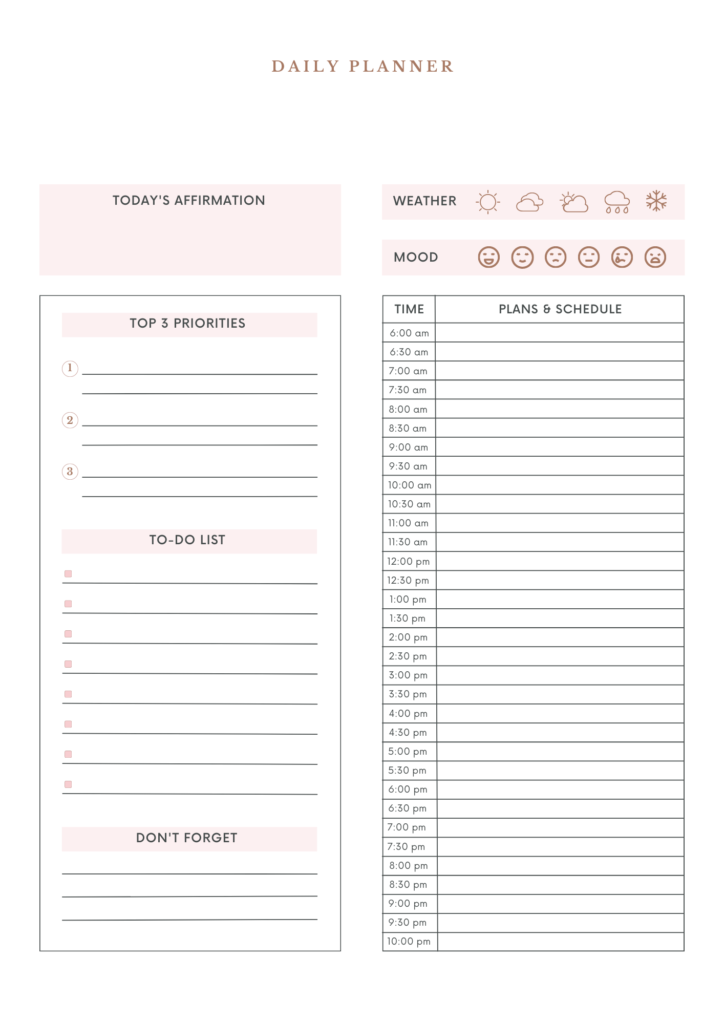
How You Can Set Up a SMART Goal With an Example
Goal Statement: Improve my physical fitness and overall health.
Specific
I want to lose 10 pounds, increase my cardiovascular endurance, and build muscle strength.
I will be the primary person involved, but I may seek support from a personal trainer or workout partner.
Steps to reach this goal include creating a workout plan, following a healthy diet, and tracking my progress.
Measurable
I will track my weight loss, the number of workouts per week, and improvements in my exercise performance.
Key indicators of success include losing 10 pounds, being able to run a 5k without stopping, and increasing the weight I can lift in the gym.
Achievable
This goal is realistic as I have access to a gym, can dedicate time to exercise, and have no significant health issues preventing me from working out.
Potential obstacles include a busy schedule, lack of motivation, or injuries. I can overcome these by scheduling regular workout times, finding a workout partner, and listening to my body to avoid injury.
Relevant
This goal aligns with my broader objective of living a healthy lifestyle and maintaining a balanced work-life balance.
It is important to me because I want to feel better, have more energy, and reduce the risk of health issues in the future.
Time-bound
I aim to achieve this goal within the next six months.
The timeline includes losing 2 pounds per month, gradually increasing my running distance, and consistently adding weight to my strength training exercises.
Wrap up
In conclusion, setting SMART goals is a highly effective approach to personal and professional development, as it helps individuals and organizations define clear, realistic objectives and track progress. By ensuring that goals are Specific, Measurable, Achievable, Relevant, and Time-bound, individuals can create a structured plan for success and maintain motivation throughout the process.
SMART goals provide a clear roadmap for achieving desired outcomes, allowing individuals to focus their efforts, allocate resources efficiently, and overcome potential obstacles. Moreover, they foster accountability and enable continuous improvement by regularly assessing progress and adjusting strategies as needed.
Ultimately, the adoption of SMART goals can lead to increased productivity, personal growth, and overall success, making them an invaluable tool for anyone seeking to achieve their aspirations.





2 thoughts on ““Achieving Success: How to Set and Implement SMART Goals in Your Life””